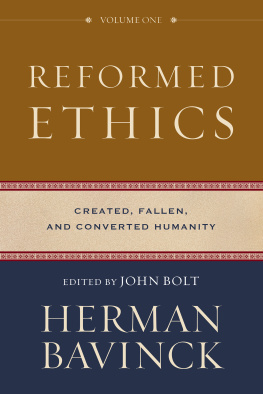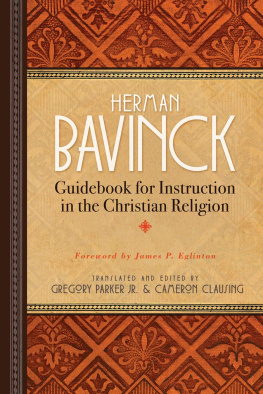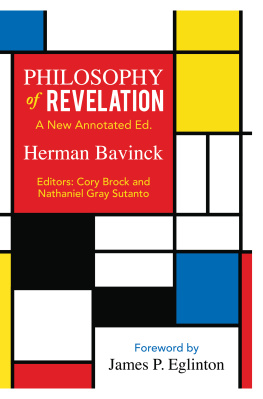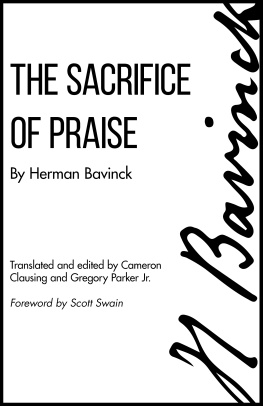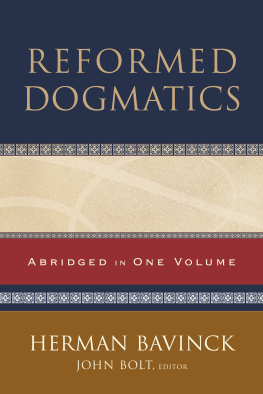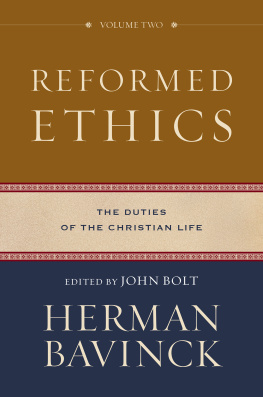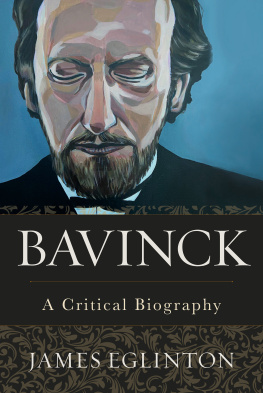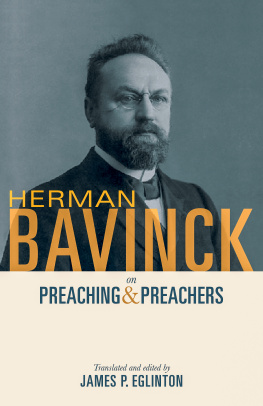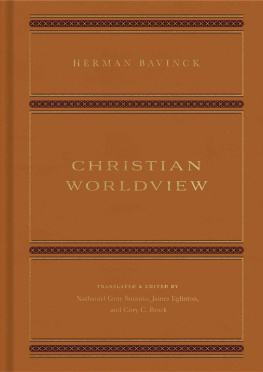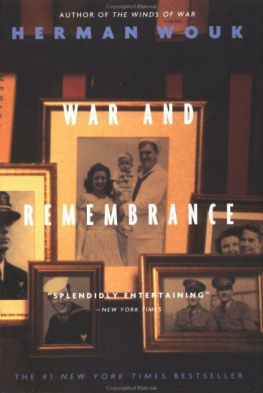Herman Bavinck - The Christian Family
Here you can read online Herman Bavinck - The Christian Family full text of the book (entire story) in english for free. Download pdf and epub, get meaning, cover and reviews about this ebook. year: 0, genre: Religion. Description of the work, (preface) as well as reviews are available. Best literature library LitArk.com created for fans of good reading and offers a wide selection of genres:
Romance novel
Science fiction
Adventure
Detective
Science
History
Home and family
Prose
Art
Politics
Computer
Non-fiction
Religion
Business
Children
Humor
Choose a favorite category and find really read worthwhile books. Enjoy immersion in the world of imagination, feel the emotions of the characters or learn something new for yourself, make an fascinating discovery.

- Book:The Christian Family
- Author:
- Genre:
- Year:0
- Rating:4 / 5
- Favourites:Add to favourites
- Your mark:
- 80
- 1
- 2
- 3
- 4
- 5
The Christian Family: summary, description and annotation
We offer to read an annotation, description, summary or preface (depends on what the author of the book "The Christian Family" wrote himself). If you haven't found the necessary information about the book — write in the comments, we will try to find it.
The Christian Family — read online for free the complete book (whole text) full work
Below is the text of the book, divided by pages. System saving the place of the last page read, allows you to conveniently read the book "The Christian Family" online for free, without having to search again every time where you left off. Put a bookmark, and you can go to the page where you finished reading at any time.
Font size:
Interval:
Bookmark:
HET CHRISTELIJK HUISGEZIN
THE CHRISTIAN FAMILY
HERMAN BAVINCK
Translated by Nelson D. Kloosterman
Edited by Stephen J. Grabill
Introduction by James Eglinton
Christians Library Press
An imprint of the Acton Institute for the Study of Religion & Liberty
Kindle Edition
Copyright 201 by Nelson D. Kloosterman
Originally published as Het Christelijk Huisgezin . 2nd revised ed.
Kampen: J. H. Kok, 1912
First published in 1908
Edition License Notes
This ebook is licensed for your personal enjoyment only. This ebook may not be re-sold or given away to other people. If you would like to share this book with another person, please purchase an additional copy for each person you share it with. If you're reading this book and did not purchase it, or it was not purchased for your use only, then you should return to Amazon .com and purcha se your own copy. Thank you for respecting the author's work.
CONTENTS
Introduction
The Christian Family in the Twenty-First Century
James Eglinton
The briefest glance at the shelves of the local Christian bookstore soon makes plain that books on the Christian family and marriage are not in short supply. Indeed, an awareness of just how many books have been written on this topic surely prompts the question as to why this book is worthy of translation and release in the English-speaking world. Further to that, this book was written in the early twentieth century Netherlandsa social context far removed from that of those likely to read this edition. What could Herman Bavincks The Christian Family have to say to us?
In the context of mainstream evangelicalism, we are not short of moralistic ten-step guides aimed at building better marriages, or promise-based programs designed to create better spouses and parent-child relationships. Thanks to the influence of Mark Driscoll on evangelical attitudes towards marriage, the more recent trend has been to shift the focus towards sex, albeit still in the form of fairly crude how to guides. To a cynical eye, this shift looks like the evangelical subculture aping its secular host-cultures views on sex and relationships (the center of which being its uncritical adoption of secular societys assumption of hypersexuality as the norm for all). As such, the gospel becomes a means to what secular values on hypersexuality tell us we should all want: more and hotter sex. The current evangelical preoccupation with sex, and its accompanying reinvention of the celebrity pastor as a Christian sex guru, risks creating a new kind of prosperity gospel: Christianity might not make you healthy or wealthy, the idea goes, but it is the key to a far better sex life. Its gospel promises to fulfill the carnal longings of your (essentially secular) heart.
In short, current evangelical attitudes towards sex within marriage appear less and less radically different from their contemporary secular equivalents. In their spoon-fed approach to sex, both are increasingly banal and formulaic.
Viewed against this backdrop, the translation and rerelease of Bavincks book on the Christian family suddenly seems more useful. This is no ten-step guide, nor is it a one-sided approach to marriage where everything is reduced to ones moral or sexual performance. Rather, this is the fruit of a rich Christian mind. It is a Christian theology of marriage and the family. This is a mature handling of the origins of marriage and family life, the effects of sin thereupon, a thoughtful appraisal of various historic Christian approaches to marriage and the family, and an attempt to apply that theology to the Christian family in Bavincks own day.
The family is foundational in many respects. Readers will be instructed by Bavincks unfolding of the importance of the family for economics and work, on the one hand, and as a template for the structure and relationships within broader society, on the other. Throughout history, the family has survived and succeeded as economic entrepreneurs and producers, and has supplied training and stability for social relationships beyond the home.
Although this book is the product of a seminal Christian thinker, it is also a product of its time. There are various emphases that will strike its present-day readers as belonging to a culture very different to their own. There are also major current debates regarding the Christian concepts of marriage and family that receive scant or no attention in this book: the most obvious examples being homosexuality and the related issue of church and civil society disagreeing strongly on the definition of marriage. That said, this book has a great deal to offer to readers at the start of the twenty-first century.
This short opening essay will attempt to open up the book by first providing a biographical sketch of its author, following which some pointers will be given to explain various emphases in this work in relation to the hallmarks of Bavincks thought.
Biographical Sketch
Born on December 13, 1854, in the Dutch town of Hoogeveen, Herman Bavinck was the son of Jan Bavinck, a Reformed pastor originally from Bentheim on the German-Dutch border, and Gesina Magdalena Bavinck (ne Holland). The second of eleven children, Herman was born into the conservative, separatist Christian Reformed Church. After completing his high school education, he enrolled as a student at the Theological School in Kampen, where his father was a professor. After one year, however, he made the daring decision to transfer to the aggressively modernist theological faculty at Leiden. The theology on offer at Leiden could scarcely have been more different to that of his fathers seminary in Kampen.
Why did he make this move? Although the young Bavinck underwent something of a crisis of faith while at Leiden (from which he eventually emerged), his choice to study in Leiden should not be read as an abandonment of orthodox theology. Rather, his choice was primarily motivated by his search for a more rigorous academic training in theology than could be offered in Kampen at that time.
Between 1874 and 1880, Bavinck studied under the likes of Johannes Scholten and Abraham Kuenenthe then superstars of Dutch academic theologyat Leiden. There, he admired the scientific approach of his professors, though he often found himself in deep disagreement with their presuppositions and doctrinal conclusions. At this time, he also came under the influence of Abraham Kuyper, the rising star of a new wave of Dutch neo--Calvinism. His Christian Reformed pastor at Leiden, J. H. Donner, introduced him to Kuypers Anti-Revolutionary Party (a Christian political movement directed against the anti-Christian influence of the French Revolution on Dutch society). At Leiden, Bavinck wrote a doctoral thesis on the ethics of the Swiss Reformer Ulrich Zwingli, following which he sought ordination in the Christian Reformed Church. In 1881 he became the pastor of the congregation in Franeker, a small town in the northern Netherlands.
One year later, Bavinck was called to teach theology at Kampen, where he taught from 1883 to 1901. There, he wrote his most important work, the Reformed Dogmatics : a modern classic of systematic theology. He married Johanna Adrianna Schippers in 1891. Johanna was ten years younger than Herman. Their only child, a daughter named Johanna Geziena, was born in 1894. During his time at Kampen, Bavinck and Kuyper were the key figures in the Union of the Reformed Churches in 1892. A decade after this Union, he accepted the post of theology professor at the Free University of Amsterdam.
This period in his life was marked by a broad and thorough engagement in the fields of politics (via the Anti-Revolutionary Party), philosophy, and education. In 1920, after preaching at Synod, Bavinck suffered a heart attack. From then onwards, his health began to fail. He died on July 29, 1921.
Next pageFont size:
Interval:
Bookmark:
Similar books «The Christian Family»
Look at similar books to The Christian Family. We have selected literature similar in name and meaning in the hope of providing readers with more options to find new, interesting, not yet read works.
Discussion, reviews of the book The Christian Family and just readers' own opinions. Leave your comments, write what you think about the work, its meaning or the main characters. Specify what exactly you liked and what you didn't like, and why you think so.

